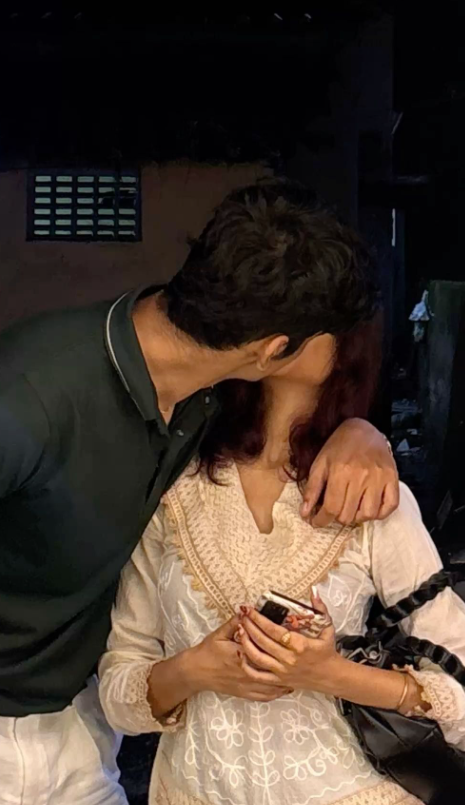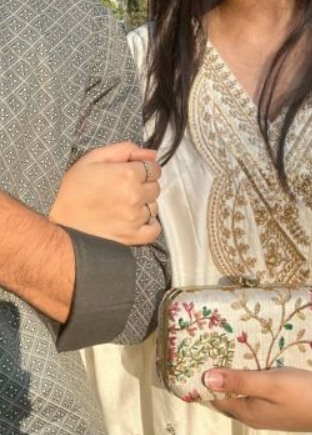
Today was my hospital ultrasound day, and I was nervous in a way words can’t explain.
It wasn’t the doctor or the test that scared me — it was the truth that might come out of that cold white room.
And maybe, somewhere deep down, it was because the doctor was Siddharth himself.
He looked calm, focused, like every other professional in a white coat.
But I knew him better than anyone — the small twitch near his eyebrow, the way he tightened his jaw before breaking difficult news.
That told me everything.
He smiled at me softly. “Ready, Mrs Thakur?”
“Only if you promise not to scold me afterward,” I tried to joke, but my voice trembled.
He nodded and helped me settle onto the bed. The gel felt icy, the room smelled of antiseptic and fear.
For a second, he leaned close, his voice a whisper.
“Hey,” he said, “before we start…”
He bent down, touched his lips gently to my stomach, and smiled. “For courage.”
The monitor hummed to life.
And then — there it was.
The tiny rhythmic sound that didn’t belong to either of us yet somehow belonged to both.
Thump, thump, thump…
“Our baby,” I whispered.
Siddharth’s eyes softened, but I could see the storm behind them.
He was measuring, checking, repeating numbers under his breath.
Finally, he switched off the machine and took a deep breath.
“Gatha,” he began carefully, “there’s something we have to talk about.”
The air in the room thickened.
He hesitated. “You know because of your paralysis, carrying the pregnancy further will need extra monitoring. Normal delivery isn’t possible. Even a C-section could be complicated.”
I stared at him, the words sliding over me like cold water.
He continued, voice gentle but shaking, “If—if you want to think about other options, it’s still not too late.”
For a heartbeat, the world went silent.
I felt something inside me crack — not my body, but my heart.
Tears filled my eyes before I could stop them.
I shook my head, barely finding my voice. “Please… don’t say that, Siddharth. Don’t take this hope away from me.”
He stepped forward instantly, panic flashing in his eyes. “Hey, no, no, I didn’t mean—”
But I was already crying. The gel on my skin felt cold, but my chest was burning.
“Do you know how long it took me to believe that I could be a mother?” I said, words tumbling out between sobs. “That I could still do something beautiful even if my legs don’t move? Don’t ask me to let go now.”
He froze, guilt written all over his face.
Then he dropped the gloves, came beside me, and took my hand carefully.
“I’m sorry,” he whispered. “I wasn’t thinking like your husband — I was thinking like a doctor. I just… I can’t stand the thought of you in pain.”
I squeezed his fingers. “Then stay beside me. That’s all I want.”
For a moment, neither of us spoke. The monitor still showed the faint outline of our child — small, fragile, alive.
Siddharth finally said, his voice low, “Alright. No more talk about ending anything. We’ll be careful, we’ll do every test twice, every scan three times if needed. But we’ll keep this baby safe.”
I nodded, still crying, but this time from relief.
He leaned closer, resting his forehead against mine. “You’re my strength, Gatha. I should’ve remembered that.”
I smiled through my tears. “You’re forgiven, Doctor Thakur. But you’ll need to buy me chocolate on the way home.”
He laughed softly — the first real laugh that day.
“Deal. Chocolate therapy for my favourite patient.”
As we left the room, the sunlight streamed through the hospital corridor, falling on the printed ultrasound photo in my hand.
A tiny heartbeat, captured in black and white — the size of a coin, but big enough to hold our whole world.
Fifty days passed like a blur of sleepless nights and soft sunlight.
Pregnancy had begun to show its stubborn side. My hair thinned a little, my ankles stayed swollen, and the mirror stopped being kind.
I would sit near the window, running my fingers through my hair and watching the strands fall. Each time I did, Siddharth would quietly walk in, take the comb from my hand, and say, “Enough of counting what you’ve lost. Let’s count what’s still shining.”
He made sure I rested properly. Every evening, after work, he would rub oil into my scalp, slow and careful, talking about nothing serious—sometimes about the hospital, sometimes about what name we’d give the baby.
It wasn’t a treatment; it was love disguised as care.
When my legs cramped or my body ached, he’d help me stretch them gently. “It’s just the muscles complaining,” he’d say. “They’ll calm down soon.”
He never made me feel weak. He made me feel alive.
One night he came home carrying a small packet wrapped in red paper.
“Close your eyes,” he said.
When I opened them, a pair of delicate silver anklets glimmered in his hands—tiny elephants carved along the chain.
“For me?” I asked, surprised.
“For my queen,” he said simply. “No part of you is ugly, Gatha. Everything about you is beautiful.”
I didn’t cry that time; I laughed. The kind of laugh that comes when your heart forgets its fear.
He knelt and fastened the anklets carefully around my feet. The tiny bells chimed, soft as rain.
For the first time in weeks, I didn’t think about the hair I’d lost or the fatigue in my bones. I thought about how lucky I was to be loved like this.
After that night, a new rhythm returned to our lives.
Mornings were for vitamins and breakfast that Dadi forced on me.
Afternoons were for Siddharth’s hospital stories.
And evenings—our favourite—were for music. He’d bring his guitar, strum quietly, and let me hum along until sleep came.
Back to College
Two months later, my college reopened. It was my final year, and though everyone insisted I rest, I couldn’t let it slip away.
Siddharth dropped me on the first day himself, fussing like a parent.
“Don’t skip lunch,” he said. “And message me after each lecture.”
I smiled. “You realise you sound like your mother now?”
He groaned. “Good. At least one of us will keep you disciplined.”
At college, people stared again—my visible bump, the wheelchair, the whispers.
But this time, I didn’t care.
The anklets around my ankles made a soft sound with every move, and that sound reminded me of his words: Everything about you is beautiful.
I studied harder than ever, fuelled by something bigger than ambition—hope.
Becoming a Doctor
By the end of that year, I stood—well, sat—with my classmates, holding my degree certificate.
Dr. Gatha Thakur.
It looked unreal, the title glowing in the sun.
When I looked up, Siddharth was there in the crowd, clapping louder than anyone else, a proud grin stretching across his tired face.
Later, as everyone gathered for photos, he whispered, “So, Doctor Thakur, ready to be my partner?”
I blinked. “In life or in clinic?”
He smiled. “Both.”
We laughed, the sound mixing with the cheers and camera flashes.
That evening, we walked—or rather, rolled—out of the campus together for the last time.
The wind carried the smell of monsoon dust and celebration.
He pushed my wheelchair toward the parking lot and said softly, “You know, these last few months have been the hardest of our lives.”
I nodded. “But also the best.”
He looked at me with that quiet pride I’d come to love. “Then let’s promise each other one thing.”
“What?”
“No matter how hard the world gets, we’ll keep finding ways to make it beautiful again.”
The anklets chimed in answer.
The Jail Meeting
The air in the visiting hall was thick and stale, heavy with the smell of iron and disinfectant.
Vikrant sat at the metal table, hands clenched, eyes burning. Fifty days in prison had drained the colour from his face, but not the fire from his eyes.
The door opened with a metallic screech.
The jailer entered first, followed by a man in an immaculate grey suit — calm, polished, carrying a faint smile that only made the silence sharper.
Gautam Singhania.
Vikrant’s jaw tightened the moment he saw him.
Of all people, he never wanted to see this man again.
Vikrant: (coldly) “Why are you here, Gautam? I’ve seen enough walls. Don’t make me see another.”
Gautam: (smiling) “Walls, yes. But these ones talk. I thought you might appreciate a visitor who speaks your language.”
He placed a small box of sweets on the table. “Here. Good news deserves sweets.”
Vikrant didn’t touch the box.
Vikrant: “Good news? For a man behind bars?”
Gautam: “You’re becoming a grandfather. Congratulations, Dr. Vikrant Thakur.”
He leaned back in his chair, the smirk never leaving his face.
Vikrant: (low) “If you came here to mock me—”
Gautam: “Mock you? No. I came to inform you. And perhaps, remind you.”
He folded his hands neatly. “Do you know the judges have started passing orders in your favor?”
Vikrant frowned. “What do you mean?”
Gautam: “Oh, don’t look so surprised. Someone is working behind the scenes. Someone who believes in giving the Thakur family one last chance.”
He paused, studying Vikrant’s face. “Do you know why your and Reva’s marriage began to fall apart twenty-five years ago, when she was pregnant with Siddharth?”
Vikrant’s brows drew together. “What nonsense are you talking about?”
Gautam: “You really don’t remember? Let me refresh your memory.”
He took out his phone, swiped through it, and turned the screen around.
The photo glowed in the dim light.
A much younger Vikrant, caught in a private moment — leaning toward another woman, his lips on hers.
Vikrant’s breath caught in his throat.
“That’s… impossible.”
Gautam: “Oh, it’s very possible. Reva saw it too — at the hospital, the night she went into shock and delivered Siddharth prematurely. That was the night your hospital records mysteriously collapsed, and your so-called empire began to crumble.”
He leaned forward, voice dropping lower.
“History has a habit of repeating itself, Dr. Thakur. And it’s about to happen again — with your son, Siddharth, and his wife.”
Vikrant’s fists clenched so hard the veins showed.
He hated Gautam — the arrogance in his tone, the pleasure in his words — but even through that, one thought screamed inside his head: Siddharth and Gatha.
Vikrant: “Why are you doing this? Tell me what you want. How much money do you want? I’ll give you everything. Just leave them alone.”
Gautam chuckled softly.
Gautam: “Money? You think I’m after your coins? Tell me, Vikrant, can you give me more than the value of an entire hospital network? More than the influence I already own?”
He tilted his head, his smile turning thin. “Besides, I hear Siddharth recently took control of the hospital again. The judges reinstated his license. So he’s rising, isn’t he? Just like you once did.”
Vikrant’s silence was heavy. Gautam could see the dread forming behind his glare.
Gautam: “Oh, and by the way,” he added lightly, “I heard yesterday was their coronation — your son and daughter-in-law celebrated her medical degree. Touching. Perfect timing, too.”
He paused deliberately. “Would you like to know about the complications in your dear granddaughter’s pregnancy?”
Vikrant’s head snapped up. “What complications?”
Gautam’s smile widened. “Ah, so you didn’t know. Well… let’s just say your daughter-in-law’s condition is delicate. There are risks. Some things she might not survive. Sad, isn’t it? History’s symmetry.”
Vikrant’s breath came faster. “You monster… what have you done?”
Gautam raised his hands innocently. “I haven’t done anything. I simply know things. But then, information is the new weapon, isn’t it?”
He reached for his phone again, scrolled once more, and slid it across the table.
This time, the photo on the screen froze Vikrant completely.
It showed Siddharth — his son — caught in a candid shot, hugging a young woman at what looked like a hospital corridor.
At first glance, it looked innocent. But from the angle, from the moment, it could be twisted into anything.
Gautam’s words came like slow poison.
“See? A perfect picture. A son following his father’s legacy. History repeats.”
He stood up, adjusting his coat.
“Well, Dr. Thakur, I’ll leave you to digest the sweets and the news. Both are bittersweet, I’m afraid.”
Vikrant’s voice broke through the silence, hoarse but filled with rage.
“Why are you doing this, Gautam? What did we ever take from you?”
Gautam stopped near the door, half-turned, and said quietly:
“You took what I wanted most — respect. So now, I’ll take what you love most — peace.”
He slipped his phone back into his pocket, his last words soft but sharp as a blade.
“Let the past repeat itself. After all, some stories are too delicious to end.”
Then he walked out, leaving Vikrant alone at the metal table — the untouched box of sweets between them, as silent proof that even in the darkest places, betrayal could still taste sweet.



Write a comment ...